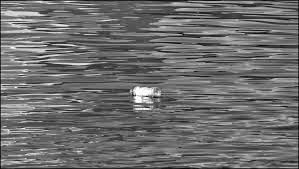Most of us contribute to good causes. Such gifts are subject to our means and undoubtedly make a difference. I would like to think of them as symbolic of a much deeper level of commitment. The kind of support I am thinking about right now, can happen at any time and it is something anyone can do.
1-We can act first.
Those who resort to violence do so through a belief that this is the only or the most effective option. As Quakers we have an opportunity to pre-empt this choice, by showing that we are prepared to listen, that we can be respectful of different situations and perspectives. Acting first often requires courage. We may choose to be compassionate and forgiving, taking care not to lose sight of the potential and worth of another human being. In the words of William Penn, we can
"See what love can do."
2-We can set a good example.
This is a very big commitment. By setting a good example we provide individuals and communities that may be very much less fortunate than our own with an alternative way of living, perhaps a different set of priorities, and consequently a choice.
In the words of George Fox, we have the option to
"Be patterns, be examples in all countries, places, islands, nations, wherever you come, that your carriage and life may preach among all sorts of people, and to them; then you will come to walk cheerfully over the world, answering that of God in every one."
George Fox, 1656
3-We can pray
For those Quakers brought up in the tradition of programmed meetings this may seem a very predictable suggestion. Others might own to being totally mystified by some of the language Quakers use, wondering whether "Holding anyone in the Light" says as much about our wish to seem proactive and important, and, in comparison to "proper prayer", more of a compromise arrangement.
Quakers believe that anyone can approach God directly, so perhaps it is understandable that at times we can feel a little awkward to step in, doing something those in need of support might just as easily do themselves. Instead of being proactive in our prayer, many of us prefer to wait.
Since God is all-powerful, prayers are never wasted. Although this may be in ways we do not expect, or through a wider perspective than we can possibly imagine, our prayers will be answered in some way.
We do not know the solution to many of the world's problems, so will never be in a position to present God with a list of alternatives that we would like him to do. Instead, I think through worship we gain clarity, and in our response to all the worlds' suffering, a renewed responsibility to communicate God's love directly and practically in which ever way we can.
The Role of Jesus
"Consider now the prayer-life of Jesus. It comes out most clearly in the record of St Luke, who leaves us with the impression that prayer was the most vital element in our Lord’s life. He rises a great while before day that he may have some hours alone with His Father. He continues all night in prayer to God. Incident after incident is introduced by the statement that Jesus was praying. Are we so much nearer God that we can afford to dispense with that which to Him was of such vital moment? But apart from this, it seems to me that this prayer-habit of Jesus throws light upon the purpose of prayer.I think of those long hours alone with God. Quite obviously petition can have had a very small place in our Lord’s thoughts. We cannot suppose that He whose chief desire was that God’s will should be done in all things could have been incessantly asking, asking. There must have been a sacred interchange far deeper than this. Especially are we sure that He was not praying for material blessings to be enjoyed by Himself alone. On the only occasion recorded in which He asked (in perfect submission) something for Himself, at Gethsemane, His request was not granted.
My own belief is that outward circumstances are not often (I will not say never) directly altered as a result of prayer. That is to say, God is not always interfering with the working of the natural order. But indirectly by the working of mind upon mind great changes may be wrought. We live and move and have our being in God; we are bound up in the bundle of life in Him, and it is reasonable to believe that prayer may often find its answer, even in outward things, by the reaction of mind upon mind. Prayer is not given us to make life easy for us, or to coddle us, but to make us strong … to make us masters of circumstance and not its slaves. We pray, not to change God’s will, but to bring our wills into correspondence with His."
William Littleboy, 1937
Quaker Faith and Practice 2.24


























.jpg)



